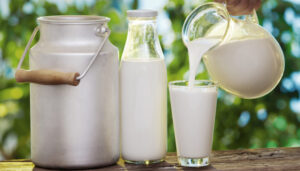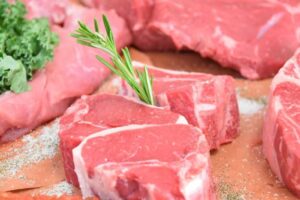
In January, Ukraine increased imports of dairy products by 55% compared to the same period last year, Infagro news agency reported.
“The market of fresh dairy products began to revive in February. Sales growth is rather slow, there is no positive dynamics that was observed in the same period of previous years. In February, prices began to stabilize, but unfortunately, by this time they had already reached a very high level,” analysts said.
Experts suggested that in order to stimulate sales, it would be right to reduce prices, especially for sour cream and cottage cheese. Therefore, the major players will try to resort to promotional sales with significant price reductions more often in the near future. In any case, there should definitely be no further price increases, they believe.
“Domestic producers should already be concerned about a significant increase in imports of fresh dairy products. In January, they were imported by 55% more than in the same period last year. And if earlier Ukraine mainly imported yogurt and various cheese products, in January several hundred tons of cheap Polish milk were imported. Polish imports of fresh dairy products accounted for 60% of the total volume,” the industry publication emphasized.
Exports of fresh dairy products are also growing, but not at the same rate as imports. The main export market for Ukrainian fresh dairy products remains Moldova, 88%, Infagro summarized.

Ukraine’s imports of goods in January 2025 increased by 7.8% y-o-y, from $5.1 billion to $5.5 billion, while exports decreased by 5.9%, from $3.4 billion to $3.2 billion, the State Customs Service reported on Monday.
According to information on its website, January imports are the highest since 2023, when they reached $4.8 billion, while exports returned to the level of 2023, when they amounted to $3.1 billion.
“Taxed imports (in January-2025 – IF-U) amounted to $4.1 billion, which is 74% of the total volume of imported goods. The tax burden per 1 kg of taxable imports in January 2025 amounted to $0.49/kg,” the State Customs Service said in a statement.
It is noted that China imported the most goods to Ukraine – by $1.4 billion, Poland – by $487 million and Turkey – by $389 million.
Ukraine exported most of its goods to Poland – by $352 million, Italy – by $205 million, and Spain – by $202 million.
In the total volume of goods imported in January 2025, 68% were in the categories of machinery, equipment and transport – $2.2 billion (UAH 12.9 billion, or 27% of customs revenues, was paid to the budget), chemical products – $901 million (UAH 7.3 billion, 15%), and fuel and energy – $734 million (UAH 14.2 billion, 30%).
The top three most exported goods from Ukraine were food products ($1.8 billion), metals and metal products ($325 million), and machinery, equipment, and transport ($282 million).
In January 2025, a total of UAH 22.2 million was paid to the budget during customs clearance of exports of goods subject to export duties.

In January, Ukraine increased pork imports, the total volume of which exceeded foreign purchases in October-December 2024, the Pig Producers of Ukraine (PUA) association reported, citing preliminary customs statistics.
“During the first month of the year, Ukraine imported about 323 tons of pork, which is more than twice the total volume of products imported in October-December last year, as well as in January 2024. Although there has been a revival in import activity, the import flow is not so active as to significantly affect the domestic market,” the industry association noted.
The analysts drew attention to the fact that the increased interest of Ukrainian meat market players in imported raw materials has led to an increase in domestic pork prices.
“The average purchase price of slaughterhouse pigs in January increased by 5.5% compared to December, which is an atypical price behavior for the winter period, as it was the market’s response to a decrease in domestic supply. European pork prices, on the other hand, continued their typical seasonal decline. Therefore, although the average customs value of a kilogram of imported pork was higher than it was recorded last year ($2.84 vs. $2.52 per kg excluding VAT on average in 2024), a number of meat processing enterprises took the opportunity to optimize raw material costs in this way,” the experts noted.
They reminded that imports of pork have historically played a role of leverage on domestic prices, but currently its volumes do not put pressure on quotations, as most meat processors do not currently feel the inflow of imported raw materials.
Exports of pig meat in January were slightly lower than imports, amounting to 295 tons. In addition to the main sales markets (UAE, Hong Kong, Malaysia, Liberia), pork supplies to Georgia resumed at the beginning of the year, the USBA stated.

Electricity imports in January 2025 decreased by 63.2% to 159.09 thousand MWh compared to December 2024, while exports increased 9 times to 63.4 thousand MWh, according to the Energy Map portal.
Thus, according to the calculations of the Energoreforma Internet portal, based on these data, electricity imports in January 2025 exceeded exports by 2.5 times.
Most of the electricity was imported in January from Poland – 50.78 thousand MWh (31.92% of the total). This was followed by Slovakia – 42.46 thousand MWh (26.69%), Hungary – 41.2 thousand MWh (25.9%), Romania – 23.38 thousand MWh (14.7%), and Moldova – 1.26 thousand MWh (0.79%).
In terms of exports in January, Moldova ranks first – 27.14 thousand MWh (42.81%) were supplied there. Hungary exported 21.12 thousand MWh (33.31%), Romania – 8.18 thousand MWh (12.9%), Slovakia – 6.27 thousand MWh (9.89%), Poland – 0.68 thousand MWh (1.08%).
As reported, electricity imports in December 2024 increased by 2.7 times compared to November – up to 433.4 thousand MWh, while exports decreased by 6.1 times – to 6.8 thousand MWh.
“In 2024, Ukraine imported 4436.6 thousand MWh of electricity, which was the highest figure for the last 11 years (actual data before 2014 are not publicly available). At the same time, electricity exports reached a historic low of 348.5 thousand MWh,” says the annual review provided to the Energoreforma project by DiXi Group, a Ukrainian energy and climate think tank.

Electricity imports in 2024 became the largest since 2014, reaching almost 4.5 million MWh, while exports fell to a historically low level during this time – almost 350 thousand MWh, Ukrainian energy and climate think tank DiXi Group reported with reference to the open data portal Energy Map.
“In 2024, Ukraine imported 4436.6 thousand MWh of electricity, which was the highest figure for the last 11 years (actual data before 2014 are not publicly available). At the same time, electricity exports reached a historic low of 348.5 thousand MWh,” says the review provided by DiXi Group to the Energoreforma project.
According to the center’s analysts, the main reason for the abnormal figures was Russian strikes on Ukraine’s energy infrastructure.
They note that from March 22 to December 25, 2024, the Russian Federation carried out 13 massive missile and drone attacks, firing 846 missiles of various types and 866 UAVs.
Of these, 230 missiles (27%) and 25 UAVs (3%) were not shot down by air defense forces or neutralized by radar systems, probably hitting their targets.
Imports peaked in June and July, when the shelling was compounded by the heat wave and the traditional scheduled maintenance of some power units to prepare them for the fall and winter.
“In June, imports reached 858.4 thousand MWh, which is 6% more than was purchased for the whole of 2023 (806.4 thousand MWh), and is the highest monthly figure since 2014 (according to available data),” the review says.
In 2024, Ukraine received 38.4% of imported electricity from Hungary (1705 thousand MWh). Ukraine imported 1036.5 thousand MWh from Slovakia (23.4% of the total), 819.6 thousand MWh from Romania (18.5%), 636.6 thousand MWh from Poland (14.3%) and 238.9 thousand MWh from Moldova (5.4%).
Electricity exports in 2024 amounted to 348.5 thousand MWh, which is 5% less than in 2023 and 90% less than in pre-war 2021.
During the year, exports were carried out to all available destinations. Most electricity was exported to Poland (88.4 thousand MWh, or 25.4%). Hungary received 76.6 thousand MWh (22%), Romania – 71.2 thousand MWh (20.4%), Moldova – 56.8 thousand MWh (16.3%) and Slovakia – 55.5 thousand MWh (15.9%).
The peak volume of exports was recorded before the start of massive shelling – in March, during which Ukraine exported 154.1 thousand MWh (44% of the annual volume). For 140 days, from May 12 to September 29, electricity exports from Ukraine were completely stopped. In total, exports were carried out for 151 days (41% of the year), while for 215 days (59%) there were zero exports. Imports, on the other hand, practically never stopped – its complete absence was recorded only on two days of the year.

At the end of 2024, for the first time in Uzbekistan, imports of electric and hybrid cars outnumbered traditional gasoline cars. According to the Customs Committee, published by Gazeta.uz, 80,235 passenger cars worth $1.9 billion were imported into the country during the year. At the same time, this is 7% less in quantitative terms (-5,710 units) and 33.1% less in monetary terms (-$632.6 million) compared to 2023.
Imports of cars with gasoline engines decreased by 36.3%, amounting to 32,928 units (compared to 51,699 a year earlier). The cost of imports also decreased significantly – from $1.18 billion to $707.2 million (-40%). The share of gasoline cars in total imports decreased from 64.4% to 44.2%.
Imports of hybrid cars increased by 42%, reaching 17,480 units. Their total value amounted to $339.3 million, which is 17% more than in 2023. The share of hybrids in total imports increased from 15.3% to 23.4%.
Electric vehicles showed even more impressive growth: the number of imported cars increased 1.5 times, from 16,084 to 24,095 units. At the same time, their cost decreased by 48.2% to $224.8 million. The share of electric vehicles in imports increased from 20% to 32.3%.
The average cost of an imported electric car decreased almost threefold, from $26,972 to $9,330 (excluding VAT and customs duties). Hybrid cars also fell in price, but less significantly: the average price dropped by 17.6%, from $23,570 to $19,410. For gasoline cars, the decline was only 6%, from $22,858 to $21,476.
The growing demand for environmentally friendly vehicles is being stimulated by tax and customs incentives. Imports of electric vehicles are exempt from excise duties, customs duties, and road tolls. Taxi drivers using electric and hybrid vehicles are exempt from license fees until 2030. Entrepreneurs are entitled to benefits for the installation of charging stations, which will be introduced in 2023.
In addition, the registration of electric vehicles and hybrids is cheaper than that of gasoline cars. For example, the cost of registering an eco-friendly vehicle is 1.5 BRV, while for gasoline cars it is 6.84 BRV.
Problems with LPG refueling and the high cost of gasoline also contribute to drivers’ switching to electric vehicles. As a result, the share of eco-friendly vehicles in imports reached 55.8% (33,564 units), exceeding the share of gasoline cars (44.2%, 32,928 units).